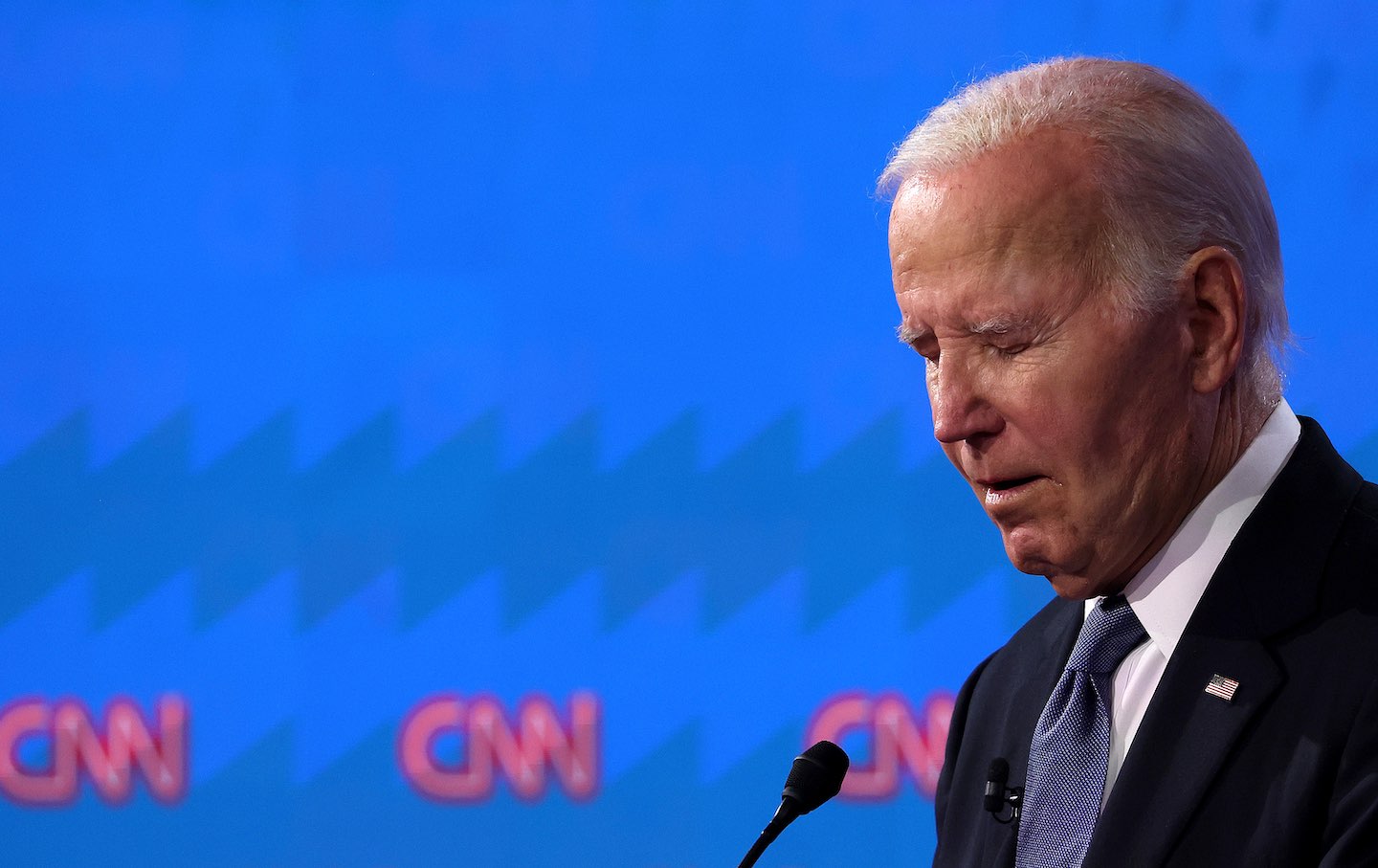Biden’s Record Won’t Win Him the Election if He Can’t Make Sense for 2 Minutes at a Time
At last night’s debate, the president could hardly get through an answer to a question without seeming to get confused.

President Joe Biden participates in the CNN Presidential Debate at the CNN Studios on June 27, 2024, in Atlanta, Georgia.
(Justin Sullivan / Getty Images)June 27, 2024, may well be remembered as the day the great fiction of Democratic credentialism unraveled, in full view of an American nation watching the first presidential debate of the election cycle. To say that President Joe Biden was not up to the challenge is to be incredibly generous. From the moment he walked onstage, muttering, “Hello, folks,” to no one in particular, he was a man out of sync with everything. He stumbled over nearly every reply to questions from CNN moderators Jake Tapper and Dana Bash, consistently losing his train of thought, and landed several times on a complete malapropism. In an early question about tax policy, Biden finished with this out-of-nowhere formulation: “We finally beat Medicare.”
That provided Trump with the very thing Biden didn’t need to give him: ample ammunition. “He’s right that he finally beat Medicare,” Trump rejoined, launching one of the countless demagogic assaults on border enforcement that was the mainstay of his performance. With “all these people coming in…. This man is going to single-handedly destroy Social Security. He will wipe out Social Security, he will wipe out Medicare. He was right the way he finished that sentence.”
The ensuing hour-plus was little more than an extended variation on that exchange: Biden rattling through under general anesthesia, and Trump pouncing with the élan of a man who cannot believe his good fortune. When the moderators brought up border policy, Biden trailed off into half-baked policy-speak, citing the “total ban relative to the total initiative,” in a context no listener could parse. Trump once more lowered the boom: “I really don’t know what he said at the end of that sentence. I don’t think he knows either.” He then once more whaled away at the rally-tested word-picture of a border producing mass bankruptcy and sociopathy. When he disputed Biden’s (accurate) claim that he, not Trump, had won the endorsement of the Border Patrol union, Trump slid into pure derision: “Just talk to them, Brandon.”
In an earlier exchange about abortion rights—far and away the Democrats’ strongest issue in this election—Biden inexplicably brought up the rape and murder of a young woman by an undocumented immigrant, seemingly to segue into a discussion of the failure of Republicans to allow an exception to abortion bans in cases of rape and incest. But to viewers, the moment just registered as a bizarre digression by a candidate who was too unfocused on the question at hand—all while he cynically sought to demagogue the nonissue of immigrant violent crime in a Trumpian register.
At times, Biden was provoked into more lucid and less somnolent modes of expression, calling out Trump’s battery of criminal and civil offenses by announcing that the presumptive GOP nominee has “the morals of an alleycat,” and rightly denouncing his notorious libel of dead soldiers as “losers and suckers.” “My son was not a loser and a sucker,” Biden said, referring to his late son, Beau, who had served in the Iraq war. “You’re a loser and a sucker.”
But those flashes of righteous outrage were woefully few and far between. Most of the time, a president who has repeatedly depicted this election as an existential battle for the soul of the country and the fate of American democracy simply fell into rote formulations of exasperation—replies that did nothing to dispel the qualms of an electorate over his waning powers of recall and expression. Over and over again, Biden began his ripostes with the hauteur-heavy phrase “the idea that,” as though Trump’s offenses had more to do with breaches of etiquette than with scorched-earth assaults on democratic traditions and practices. Biden also repeatedly proclaimed in disbelief, “We’ve never had a president talk this way before”—a formulation that is scarcely news to anyone who’s paid attention to American politics over the past eight years. When Trump dropped the bombshell revelation that he’d consider jailing members of the House Select Committee to Investigate the January 6th Attack on the United States Capitol, it wasn’t Biden who followed up on the ominous implications of the executive branch seeking judicial retribution—it was the debate moderators.
The urgent question before the Democratic Party is whether to keep Biden at the top of the ticket in what had been, prior to last night’s calamity, a closely fought election. But the person of Biden is less a cause of the party’s woes than a symptom. Biden, after all, can claim the same status that Hillary Clinton routinely did during her candidacy against Trump in 2016—that’s he’s preeminently qualified to be president, and that his long policy résumé and dealmaking track record in Washington are more than sufficient to earn voters’ trust for a second term. Clinton’s candidacy was perfectly summed up in its tone-deaf rejoinder to Trump’s campaign slogan: “America is already great,” with the unspoken disclaimer, “and we’re the people keeping it that way.”
Biden tried to project the same image of omnicompetent management, even as he struggled to make it through a coherent reply. When Trump declared that Biden’s backing of the wars in Ukraine and Gaza were bound to set off a third world war, Biden went reflexively back into résumé mode, sputtering “the idea… ” twice before landing awkwardly on this meritocratic flourish: “I can’t think of a major leader in the world who wouldn’t want to trade places with me.”
The worship of credentialed achievement is a long-standing vice of the modern Democratic Party, going back to Adali Stevenson’s doomed egghead crusades against Eisenhower, and Michael Dukakis’s buttoned-down pitch as the “competence candidate.” But the glum moral of Biden’s disastrous debate performance is that the whole elaborate mythology of résumé-driven leadership is propping up a candidate who is clearly not qualified to be heading the party’s ticket in an election that the republic can’t afford for the party to lose.
This moment of reckoning could not be more poorly timed, but Biden’s performance has driven it home in unmistakable terms. The meritocracy was always a self-serving lie, permitting party donors, a distressingly affluent suburban voting base, and a vast retinue of consultants and message-wizards to conjure up an imaginary electorate to follow the lead of its credentialed betters. Once more, Hillary Clinton provided one of the most cogent summaries of this fancy in her 2017 campaign memoir What Happened:
One of the most important but least recognized facts in American politics is that Republicans tend to win in places where more people are pessimistic or uncertain about the future, while Democrats tend to win where people are more optimistic.… There are plenty of thriving communities in both blue and red states that have figured out how to educate their workforces, harness their talents, and participate in the twenty-first-century economy. And some of the most doom-and-gloom Americans are relatively affluent middle-aged and retired whites—the very viewers Fox News prizes—while many poor immigrants, people of color, and young people are burning with energy, ambition, and optimism.
This was yet another Democratic lurch into demographic determinism—just let the Fox News devotees die off in their dens, and the new nation of educated and tolerant entrepreneurs will move into their rightful perches atop the new information economy. Among other things, it’s a vision in which the work of politics is sidelined into the sort of placid modulation of outputs that Biden evoked when he recalled pet talking points about Pell Grants or prescription drug pricing. But politics is not ultimately about the niceties of policy administration—it’s about telling a story of what the country aspires to be, and where it needs to go. For all of his boorishness, bigotry, and rancor, Trump understands this, and while the stories he told from the debate podium were vile and untrue, they spoke directly to the ugly fears of a significant slice of the electorate. Based on the dismal opening debate of the 2024 presidential season, the country could well have to get used to hearing a president talk this way for a very, very long time.
Hold the powerful to account by supporting The Nation
The chaos and cruelty of the Trump administration reaches new lows each week.
Trump’s catastrophic “Liberation Day” has wreaked havoc on the world economy and set up yet another constitutional crisis at home. Plainclothes officers continue to abduct university students off the streets. So-called “enemy aliens” are flown abroad to a mega prison against the orders of the courts. And Signalgate promises to be the first of many incompetence scandals that expose the brutal violence at the core of the American empire.
At a time when elite universities, powerful law firms, and influential media outlets are capitulating to Trump’s intimidation, The Nation is more determined than ever before to hold the powerful to account.
In just the last month, we’ve published reporting on how Trump outsources his mass deportation agenda to other countries, exposed the administration’s appeal to obscure laws to carry out its repressive agenda, and amplified the voices of brave student activists targeted by universities.
We also continue to tell the stories of those who fight back against Trump and Musk, whether on the streets in growing protest movements, in town halls across the country, or in critical state elections—like Wisconsin’s recent state Supreme Court race—that provide a model for resisting Trumpism and prove that Musk can’t buy our democracy.
This is the journalism that matters in 2025. But we can’t do this without you. As a reader-supported publication, we rely on the support of generous donors. Please, help make our essential independent journalism possible with a donation today.
In solidarity,
The Editors
The Nation








